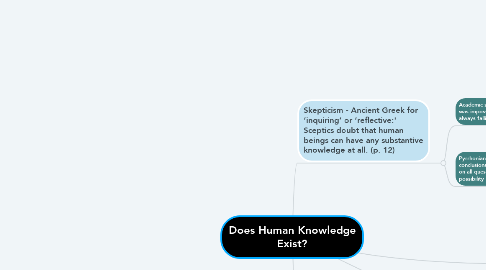
1. All Page Citations: Nagel, Jennifer. Knowledge: a Very Short Introduction. Oxford University Press, 2014.
2. A lucky guess does not constitute knowledge (p. 14)
3. Skepticism - Ancient Greek for ‘inquiring’ or ‘reflective:' Sceptics doubt that human beings can have any substantive knowledge at all. (p. 12)
3.1. Academic sceptics argued that knowledge was impossible because impressions are always fallible. (p. 13)
3.1.1. On the other hand....
3.1.1.1. How could the Academics be so certain of the impossibility of knowledge while at the same time doubting our ability to establish anything with certainty? (p. 15)
3.1.1.2. If sceptics suspend judgement even on the question of whether eating will satisfy their hunger, aren’t they at risk of starvation? (p.16)
3.2. Pyrrhonian sceptics aimed to reach no conclusions at all, suspending judgement on all questions, even the question of the possibility of knowledge. (p.13)
3.2.1. In my field, there are financial mathematical relationships that are absolute and unquestioned: for example - when interest rates rise, bond prices fall; Sceptics need not apply!
4. Stoics take a contrary view - knowledge can and does exist. (p. 14)
4.1. Judgement is the acceptance (or rejection) of an impression; (p. 14)
4.1.1. The sceptical path of resisting all judgement is not an easy one to follow, and many of the dominant figures of Western philosophy were firmly non-sceptical. (p. 17)
4.1.1.1. Descartes was not a sceptic - he took himself to have an airtight proof that scepticism is mistaken. (p. 18)
4.1.1.2. Moore's simple proof: he held up his hands (saying, ‘Here is one hand, and here is another’), explained that they were external objects, and drew the logical conclusion that external objects actually exist. (p.18)
4.1.1.3. Bertrand Russell agrees - invokes the principle of simplicity: other things being equal, a simpler explanation is rationally preferred to a more complex one. (p. 21).
4.2. Knowledge is wise judgement, or the acceptance of just the right impressions. (p. 14)
4.2.1. More arguments against Skepticism: Semantic Externalism means that words get their meanings not from the images or descriptions that individual speakers associate with those words in their minds but from causal chains connecting us to things in the world around us. (p. 24)
